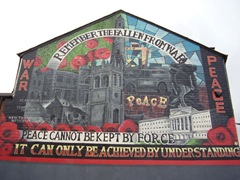The future of loyalism
 Loyalist representatives can see light at the end of the tunnel, after a troubled year so far, but warn that their communities have been left far behind.
Loyalist representatives can see light at the end of the tunnel, after a troubled year so far, but warn that their communities have been left far behind.
The murder of Bobby Moffett and Dawn Purvis’ subsequent resignation from the PUP put loyalism back into the political spotlight this summer. The troubled party chose Brian Ervine, brother of David, as its new leader in October while Purvis continues as an independent MLA.
agendaNi asked Ervine and Purvis for their views on the way ahead for loyalism. Both wanted to see an end to paramilitaries but emphasised that this will take time.
“Not only can I see an end to them, I am working towards that end,” said Ervine, who has announced that the UVF plans to ‘civilianise’ its members. “If you look over the last 10 years, the terrible murder on the Shankill was against the scheme of things and against the general flow.”
Paramilitaries, he contended, exist because there is still distrust and fear in society, including over the growing dissident threat. The former police officer warned that people will ask paramilitaries to deal with trouble-makers if they think the PSNI is not taking action.
“The PUP,” Ervine emphasises, “does not condone any crime or any murder or any form of law-breaking that the paramilitaries may get up to.”
Purvis took a tougher line: “All arguments for their existence [of paramilitary groups] are dwindling, if not long gone.”
Facilitating their withdrawal will be difficult, she said, as they are “long established institutions, part and parcel of our community and unfortunately some have criminal empires.” However, many paramilitaries have already “gone home happy” now that politics has taken their place. This leaves a “battle of wills” between criminals and “ideologues” who do not want the organisations dominated by the criminals.
“The people can play their part by continuing to illustrate their belief that paramilitarism is a relic of the past and unacceptable in a new Northern Ireland,” she added. “The PSNI can help by targeting the criminals and giving the rest the space to debate their future, shut off the lights and pull the shutter down.”
As for the peace process, Ervine described his party as “the crash dummies” who went where no unionist dared, for little return. Purvis thinks that everyone has gained, including loyalists. Specific gains for them included IRA decommissioning and Sinn Féin’s support for policing. Nationalists and republicans, though, had sold the process better than unionists.
Both politicians, though, agreed that the new Northern Ireland’s benefits have not filtered down to the worst off in society. Residents in loyalist areas are still held back by segregation and having few qualifications.
“There are forgotten corners of Northern Ireland. I see it as my job to shine a light into those corners and make sure things improve,” Purvis stated. US Vice-President Hubert Humphrey, she recalled, said the moral test of government was how it treated those in the dawn (children), twilight (the aged) and shadows of life (the sick, needy and handicapped): “This is a moral test our peace process fails.”
Inspired by his Christian faith, Ervine saw an uphill struggle ahead but “by the grace of God we can make it.” He added that without the “restraining influence” of the PUP, “there would have been a lot more murders and a lot more deaths.”





